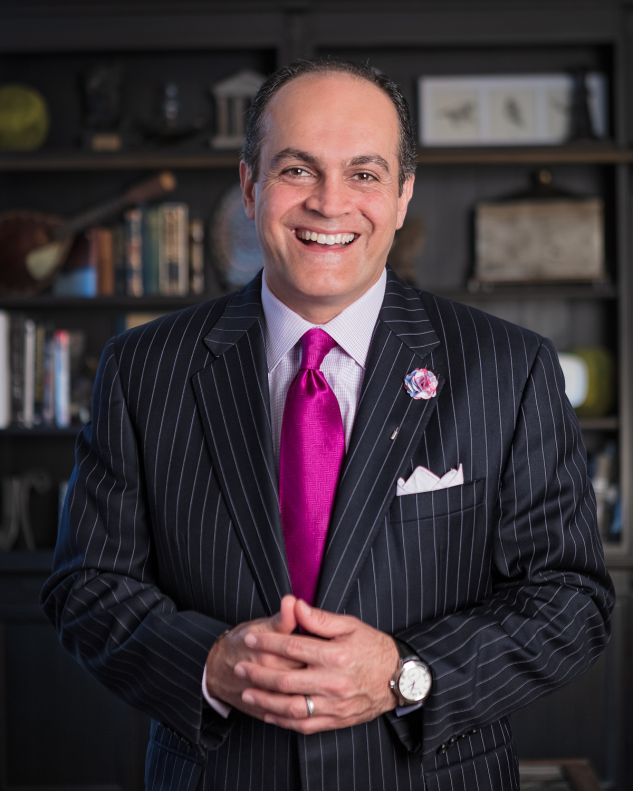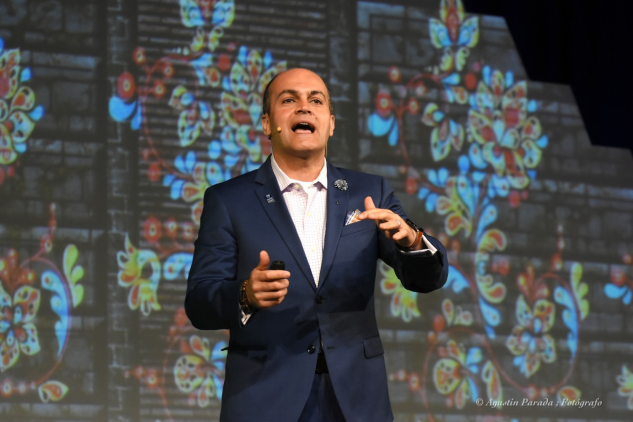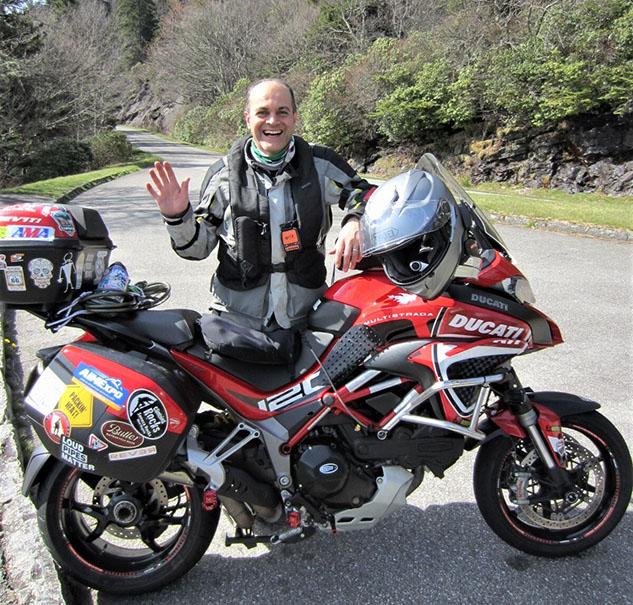For Alumnus David Nour, “Relationships First, Transactions Later” is Key to Company Performance
 David Nour (Georgia State) starts every day with an early morning walk and a “SUG” list for the hours ahead.
David Nour (Georgia State) starts every day with an early morning walk and a “SUG” list for the hours ahead.
The acronym represents “serious, urgent, growth” and keeps him focused on the strategies that have made him a best-selling author and executive leadership advisor to companies across the globe.
“What is so serious that it will hurt me if I don’t get to it?” Nour says of the first part of SUG. “Then what is so urgent that if I don’t get to it will become serious…and, third, what will lead to growth?”
Nour founded Atlanta-based Nour Group in 2002 and now counts Delta, Marriott, Disney, and Samsung among his long list of clients. He is also a sought-after speaker, delivering keynote addresses, leadership retreats, and learning expeditions focused on business growth through leadership development and strategic relationships.
Beyond acquiring new skills or knowledge from the application of those skills, says Nour, a fundamental shift in a leader’s behaviors often creates the impact they seek.
“Beyond intellectually understanding that relationships are important,” Nour adds, “those who can tap into their strategic significance consistently set themselves apart from their competitive peers.”
He said the COVID pandemic was a wake-up call to many companies needing to think and lead differently.
“It forced many business leaders to challenge their leadership assumptions and assertions,” Nour said, pointing to mandates, shutdowns, and flexible work environments.
New Country, New Opportunities
Nour came to the United States from Iran as a teenager in 1981 to complete high school. He left behind his parents, 42 first cousins, and moved in with an aunt and uncle in Atlanta whom he had never met.
He brought one suitcase, $100 in his pocket, no fluency in English, and a drive to succeed regardless of insurmountable obstacles.
Nour relied on tutors for two years to stay on pace with his peers and mastered English by reading as many books as he could get his hands on. That love of learning through reading continues today.
“My dad drove into me years ago that leaders are readers, and readers are leaders,” said Nour.
After high school, Nour enrolled at Georgia State University to pursue a business degree while working at IBM in technical support.
“My strengths were math and business…my passion was technology…and I always thought I would pursue engineering or computer science,” said Nour, recalling his early career aspirations.
That trajectory changed when Nour took a business law class at Georgia State and found his true calling.
“I fell in love with the complexity of business…and I haven’t looked back,” said Nour, who earned his executive MBA from Emory University’s Goizueta Business School, where he now serves as an adjunct professor.
He pledged Sigma Nu at Georgia State primarily to meet new people. At the time, the college was a commuter school with no housing, but a Greek system was in place. He was drawn to the values of Sigma Nu and the brothers who reflected those values.
“I really liked the history, the military background, and the focus on honor, respect, and no hazing,” Nour said. “I was older than many of my peers, so it seemed like a more mature group of guys at Sigma Nu who aligned with my values.”
Relationships Matter Most
After graduate school, Nour spent the next decade in consulting, as president of a startup in New York City, and as an Entrepreneur-in-Residence for a private equity firm with $14 billion in assets under management, before founding Nour Group in 2002.
His desire to venture out independently was spurred by the gaps he saw through direct observation of different business models, leadership styles, and organizational structures across the business spectrum.
“I saw incredible leadership teams take a mediocre idea to new heights,” Nour said. “Conversely, I saw dysfunctional leadership and teams take amazing ideas straight off a cliff.”
He realized the issues were not simply the product, the industry, or the company. It was fundamentally a relationship challenge, or a relationship opportunity missed.
Nour believes United States-based businesses often view relationships as transactional or a means to close the deal.
“The rest of the world builds relationships first, from which they do business,” Nour explains. “Unfortunately, as Americans, we’re so focused on the business part that if and only if the business part goes well, we may ask them about their family, kids, or life outside of our transactional work.”
He saw the benefits of relationship building as a business model for his venture, then embarked on a “listening tour” to gather more data.
Nour reached out to trusted friends to weigh in on what he did exceptionally well and to business executives to weigh in on the quantifiable value of relationship building.
“I learned my greatest asset was networking,” Nour said. “And what dawned on me was relationships have intentional, strategic, and quantifiable value.”
He trademarked his business approach as “Relationship Economics® - the art and science of relationships.”
Taking Relationship Economics on Tour

In August of 2004, a friend invited Nour to speak at their church about his focus on the intersection of business and relationships.
He expected a small group of five or six people in a room and arrived to find nearly 250 people in the church auditorium.
“I saw that and thought, ‘what am I going to say that they haven't already heard?’” Nour says, laughing at the memory of his first public presentation. “So I talked about my ideas of relationship currency, reputation capital, and one’s professional net worth.”
That first event led to 30 speeches that year, 50 the following year, and more than a hundred annually in the years after. At each event, audience members asked where to go for more information.
In 2006, he captured the key points in a self-published booklet and handed them out after each engagement as his “business card.”
Soon a literary agent came across the booklet, reached out, and in 2008 the booklet became Nour’s first book, Relationship Economics: Transform Your Most Valuable Business Contacts into Personal and Professional Success (Wiley, 2008, 2012). In February, a third edition of the book will be published.
Nour has authored 11 other books, including Co-Create (St. Martin’s Press) and Curve Benders (Wiley), covering the spectrum of strategic relationships, future of work, real innovation, and lasting change.
“And I have seven more in my head in various stages,” said Nour. He explained each book continues to expand upon the theme of strategic relationships, personal growth, and “enterprise value” creation.
While Nour remains a sought-after speaker and lecturer globally, he also works as an executive coach and educator, helping leaders and their teams become the best version of themselves.
Although Nour works at light speed, is admittedly short on sleep, and juggles multiple projects and family commitments simultaneously, he advises his clients that burning the candle at both ends never ends well.
“Work-life balance is a fallacy,” Nour says. “You don’t have a personal life and a work life….you have one life. So, therefore, I believe in ‘work-life blending!’”
He advises his clients to enjoy a pastime as much as they love their job. For Nour, his happy place began a decade ago with a scooter he received from his wife and kids for Father’s Day.
Since then, he’s bought and sold two dozen motorcycles (he currently owns eight), logs between 30,000 to 50,000 miles each year, and recently returned from Europe, where he rode through five countries. Nour is planning a road trip to Alaska next year.
“When I put the earplugs in, the helmet on, nobody's calling...nobody's texting…nobody wants to zoom,” Nour says of his moments of motorcycle Zen. “It's just my time to think and refill my cup.”
